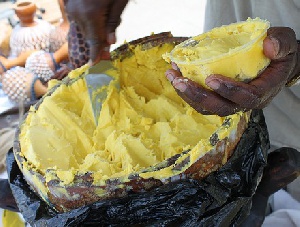The Shea sector which holds enormous economic viable business models is on the brink of collapsing in the Savannah ecological zone, said the Shea Network Ghana (SNG), a non-governmental organisation.
The sector which boosts of revenue and employment generation for an estimated number of 900,000 rural women farmers who collect, process and trade nuts and butter is currently faced with the lack of funding and implementation of a regulatory body to help position the sector for growth and increased production volumes.
It is estimated that over two million Ghanaians depend on the shea industry directly and indirectly for their livelihoods. The industry is also able to generate employment and income for about a million rural women in Northern Ghana involved in picking nuts and marketing processed shea kernels and shea butter.
In 2014, Mr Haruna Iddrisu, the then Minister for Trade and Industry, inaugurated a committee to steer the affairs of the Shea Nut sector with the government announcing GHC 5million towards the planting of two million shea trees in the three northern regions. This was aimed at ensuring sustainable growth of the sector.
He also promised to establish 12 shea nut processing plants in some selected districts within the catchment area of the project to serve as ready markets for the nuts that would be produced by the shea plantations while 1,000 women would also be trained to be part of the shea nut value chain.
Mr Iddi Zakaria National Coordinator, SNG in an exclusive interview with the B&FT during the visit indicated that the processors had also struggled with the manual way to process the products which most often does not meet the market demand though the demand is high in Ghana and other countries.
“Ghanaians have now come to understand the need to patronise the local products thereby moving away from ordinary to more organic process, but the processors could not produce much due to lack of support to expand their businesses.
“If the government can invest more into the seed production to plant more shea trees would help create more jobs in the country to alleviate poverty at the rural areas,” he said.
He also called for legislative reforms and policies to protect the shea sector from collapsing and proposed an amendment to the current law to decouple the shea nuts sector from the Ghana Cocoa Board (COCOBOD).
The Ghana Cocoa Board Act, Act 84 of 1981, puts Cocoa, Coffee and Shea under one umbrella with equal opportunities, but cocoa has dominated the economy as a cash crop because of the attention and commitment governments have given to the crop over the years.
But the shea sector embedded under COCOBOD, SNG observes, makes it difficult for the sector to get the much-needed attention from government and investors.
Blaming the rapid cutting down and burning of the shea trees for other activities which are severely affecting the income generation of the sector, Mr Zakaria explained that the organisation has been embarking on capacity building for few farmers and processors due mainly to lack of enough funds.
“Lack of capacity building and funds to train more youth to venture into the sector has been a headache for the managers of the sector to make it attractive to the youth.”
He called for support for savanna plantation to help produce more seedlings to cultivate to boost the industry.
He urged the political parties to show interest in the shea sector to create more for the able youths.
He said the two shea factories established in the northern region are not operating in full capacity though the industry has some international buyers and therefore called for the establishment of more factories with the necessary equipment.
The Executive Director of Savanna Plantation, Issah Sulemana in his response to the B&FT explained that the Presidential Special Support for Shea nut, an initiative aimed at guaranteeing the export earnings from the Shea commodity, may not be achieved as intended by the government due to lack of funds to ensure the cultivation of the seedlings.
He said Savanna Plantations had pre-financed the project to the tune of over GHC 1.2 million but had so far been paid less than GHC 900,000.00, making it difficult for the company to acquire the necessary equipment to sustain the project. This he appealed for funds for the nursery production for the farmers to ensure quality Shea that would meet the demand of the market.
Business News of Monday, 21 November 2016
Source: B&FT













